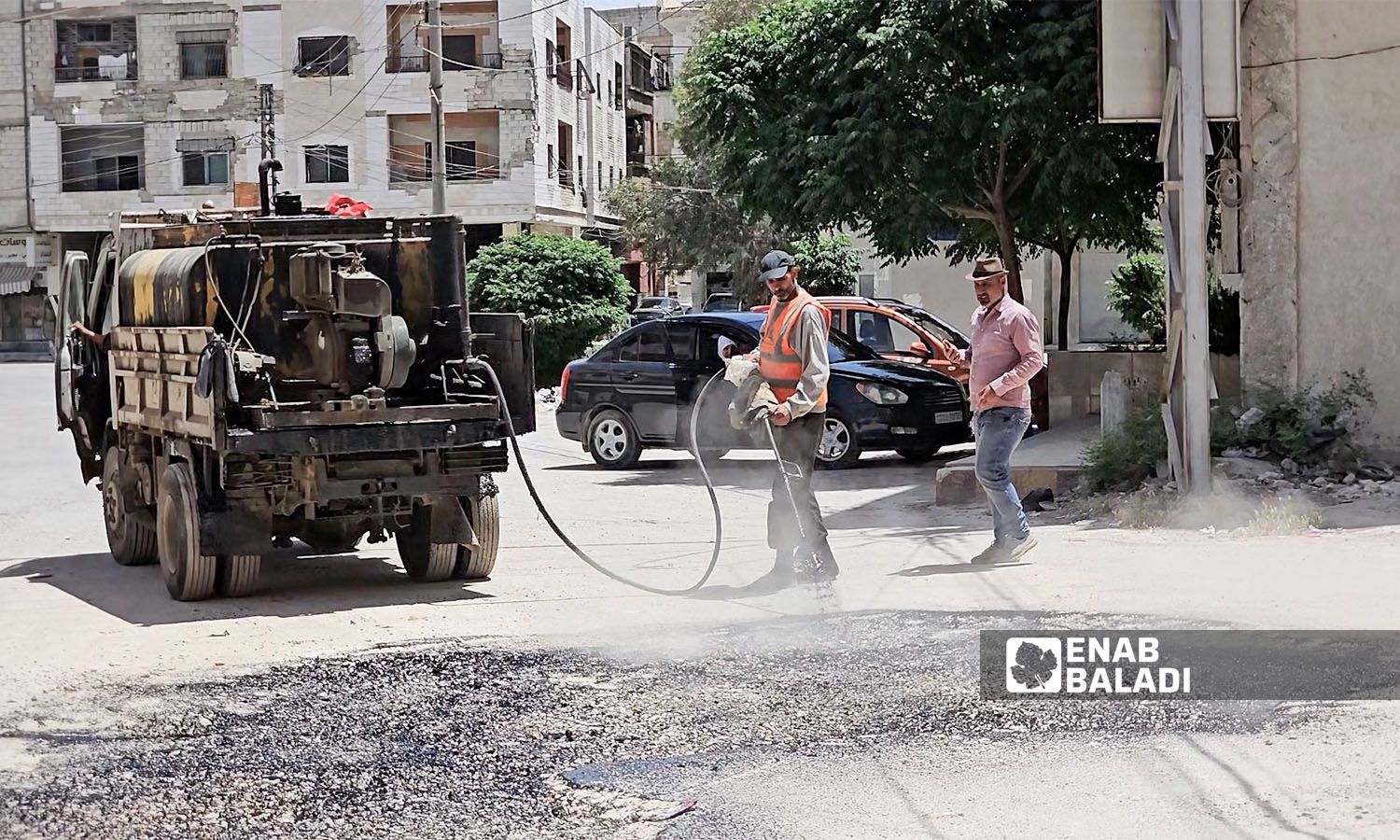Enab Baladi – Marina Merhej
Most administrative units suffer from a severe decline in infrastructure and essential services, according to preliminary reports from the Municipality Development Committees in the areas of rural Damascus. The committees also uncovered mismanagement and an increase in corruption cases.
Enab Baladi contacted Mustafa al-Said, who is in charge of the administrative units in rural Damascus, to highlight the main issues identified by the committees and the measures taken to address them.
Deteriorating infrastructure
Mustafa al-Said stated that a comprehensive file for each administrative unit has been prepared, detailing what was discussed during the tours, the current situation assessment, proposed projects, and urgent needs. The projects were classified into two categories:
Urgent projects such as sanitation and cleanliness, which were addressed directly and submitted to the Governor of Rural Damascus. Deferrable projects that will be collected and submitted later to the relevant authorities in the province or ministry.Al-Said indicated that the majority of the administrative units visited are suffering from completely or nearly destroyed infrastructure, and even those in areas that have not experienced battles are old and have not been modified for approximately 20 to 30 years, necessitating continuous maintenance.
There are also outdated and ineffective organizational plans that require updating regarding the area of the planning scheme or development in urban systems, as well as a poor distribution of projects, and a severe shortage of service machinery, particularly cleaning and sanitation equipment, most of which are in disrepair.
Regarding the administrative structure within the administrative units, al-Said noted significant inefficiency in the organizational structure of the existing human resources, a lack of a clear structure, and a deficiency in certain specialties within the administrative staff in the unit, particularly legal and supervisory specialties, which, if present, are not sufficiently qualified.
He added that there is no specialized technical team or appropriate infrastructure in the administrative units visited to cooperate with automation. Although there are citizen service centers in some cities that intersect with the Civil Affairs Directorate and other directorates, most of them are currently inactive. It was noted that employees at these centers are contracted workers, and efforts are currently underway to reactivate them and improve their infrastructure, as they are suited to cooperate with the automation file endorsed by the government’s vision.
Corruption in administrative units
The Municipality Development Committees, during their field and technical tours of the administrative units in rural Damascus, revealed widespread instances of corruption affecting different levels of the employment hierarchy, including some mayors and employees of various ranks.
According to Mustafa al-Said, this issue has been addressed since the caretaker government’s period, where concerned individuals began gathering preliminary information and took swift action to change some key administrative figures in several municipalities.
These measures included replacing between 75% and 80% of the mayors in the province, and the specialized committees are currently continuing to gather and analyze data from the remaining employees to verify any breaches and hold those involved accountable.
Al-Said pointed out that the final phase of the committees’ work focuses on gathering information and cross-referencing it, with direct handling of files that show clear indicators by the Governor of Rural Damascus or by area officials in informal settlements.
This process is being conducted alongside a plan to restructure the Ministry of Local Administration, aiming to reorganize the bodies from the central ministry down to the smallest administrative unit in the state, as part of a comprehensive reform of the local administration system.
Independent committee
The Municipality Development Committee in rural Damascus is composed of local cadres with extensive experience and in-depth knowledge of the previous work system. They were carefully selected in coordination with the Governor of Rural Damascus and supported by the Ministry of Local Administration to ensure the highest standards of competence and professionalism.
Mustafa al-Said clarified that the Ministry of Local Administration exercises a supervisory and guiding role without direct interference in the details of the work. He denied the existence of any political or security interventions in the committee’s work or in the appointment of municipalities, unlike previous practices where appointments were made directly by leaders of the Arab Socialist Baath Party or through nominal elections.
He pointed out that the committee operates with full freedom and is keen to listen to opinions and record all observations during its tours. The coordination with the Governor of Rural Damascus and area officials aims only to facilitate the work process, whether in selecting topics or determining tasks, within a professional framework and with the participation of committee members who have significantly contributed to building an accurate database regarding the realities of municipalities, which formed the basis for the field committees’ work.
The work of the Municipality Development Committees and their tours in the administrative units of rural Damascus is expected to continue until the end of July 2025.
Corruption and inefficiency in administrative units in rural Damascus Enab Baladi.
Read More Details
Finally We wish PressBee provided you with enough information of ( Corruption and inefficiency in administrative units in rural Damascus )
Also on site :
- Chipotle is Giving Away Free Burritos for An Entire Year—Here's How to Win
- Drowning’s the No. 1 killer of young children — from Orange to Pasadena, experts are trying to change that
- 'Top Chef' Season 22 Episode 12 Elimination Results: Who Was Sent Home This Week?

